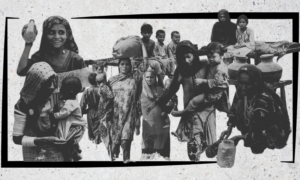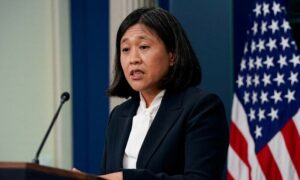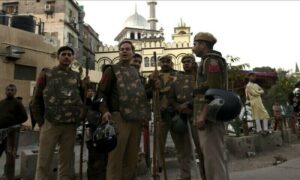There is no mechanism in place for contesting on reserved seats as nominations are made by political parties based on the number of general seats they are able to secure.
As a representative democracy, Pakistan’s Constitution empowers every citizen to have a say in the decision-making process through their representatives. However, over the course of 76 years, there are groups that remain underrepresented, particularly the country’s religious minorities, which comprise around 4.43 million registered voters across the country.
To ensure their political inclusion, the Constitution currently reserves 10 seats for religious minorities in the National Assembly, four in the Senate and 24 seats in all provincial assemblies — nine in Sindh, eight in Punjab, four in KP and three in Balochistan. Meanwhile, the local government setups in all provinces have reserved 5 per cent seats for minorities on all tiers. Yet, these minority communities object to an electoral imbalance, which they say is hampering their integration into mainstream politics.
Minorities’ representation through the ages
To understand the issue, it is imperative to acknowledge its historical context. The Muslim community in pre-partition India struggled for a separate electorate on the basis of their religious identity to safeguard their rights and ensure proportional representation in all legislative assemblies. Although opposed by Congress, the British accepted this demand and introduced a system of communal representation for Muslims through The Indian Councils Act of 1909.
Henceforth, all elections to local and legislative councils from 1909 to 1946 were held on the basis of a separate electorate system. This enabled Muslims to showcase their strength by winning a substantial number of seats, which was pivotal in paving the way for the creation of Pakistan.
After Independence, as there was no Constitution in place till 1956, elections for provincial assemblies between 1951 and 1956 in Pakistan were held under the Government of India Act, 1935. This Act was used as a provisional Constitution and provided for separate electorates. At the same time, however, there was a robust debate over the political integration of religious minorities. The dilemma was whether minorities should contest elections alongside Muslim candidates through a joint-electorate or through a separate electorate where minorities would vote for minority candidates exclusively on the basis of religious identity.
Religious parties, including the Jamaat-i-Islami, led by Maulana Mauddudi, vehemently opposed joint electorates, while some sections of the Muslim League supported separate electorates. At the time, the majority of the religious minorities lived in East-Pakistan, which demanded joint electorates for equal civil and political rights, while a small number of minorities in the western wing demanded a separate electorate system.
Amid fierce opposition from religious parties, Pakistan’s first Constitution of 1956 initially left the decision to provinces. In April 1958, a decision was finally taken in favour of joint electorates, which applied all over Pakistan. However, no targeted measures were adopted to ensure the integration of religious minorities into the mainstream political system.
Subsequently, the Constitution commission appointed by General Ayub Khan also called for a separate electorate system to be enacted, but the practice of joint electorate continued under the 1962 Constitution and also under General Yahya Khan’s Legal Framework Order. The 1970 elections were held under the system of joint electorate.
One step forward, two steps back
The 1973 Constitution of ZA Bhutto, while continuing the practice of joint electorates, provided additional safeguards for the integration of religious minorities into mainstream politics as a total of seven seats were reserved for minorities in all provincial assemblies through Article 106 of the Constitution. Later, through the Fourth Amendment, the number of provincial seats was increased to nine. Moreover, Article 51 was also amended to provide for a further six reserved seats for minorities in the National Assembly. Thus, this was the first time in 26 years that targeted measures were taken to ensure representation and political integration of religious minorities.
After imposing martial law, Ziaul Haq in 1978 amended the election laws to create separate electoral rolls for Muslim and non-Muslim voters. Religio-political parties under the banner of Pakistan National Alliance (PNA) led an organised campaign against joint electorates to not only fulfill their long-standing demand but to also counter the PPP’s popularity among minorities as their votes could potentially influence results where there were close electoral contests.
In a bid to undermine the PPP’s electoral strength, Zia imposed for the first time in the country’s history a separate electorate system for minorities through the Eighth Amendment and also amended Article 51 of the Constitution — increasing the total general seats from 200 to 207, which were declared as ‘Muslim seats’.
At the same time, the Eighth Amendment also increased the total seats reserved for minorities in the National Assembly from six to 10. Similarly, Article 106 was also amended to increase the total number of seats reserved for minorities in provincial assemblies from nine to 23, but they were all to be filled through the separate electorate system. Under this system, the entire country was made the constituency for a member of the national assembly, and for members of provincial assemblies, the whole province became the constituency.
In other words, non-Muslims, despite living alongside Muslims, were not allowed to share the same voting rights and constituencies. They would only be allowed the partial right to franchise by voting only for other non-Muslim candidates sharing the same religious identity.
For example, Hindus had four seats in the National Assembly for which an electoral roll of Hindus throughout Pakistan was prepared and the candidates for these seats had to run around all over Pakistan to canvas for votes. The candidates who secured the first four positions throughout Pakistan were declared elected to the Assembly.
In doing so, Ziaul Haq reversed the universal voting right by dividing Pakistanis into Muslim and non-Muslim voters. This ghettoisation of minorities had far-reaching implications for minorities, which segregated them along socio-economic and politically lines on their basis of their religious identity.
Maintaining status quo
The separate electorate system was implemented in the 1985, 1988, 1990, 1993 and 1997 elections. Between 1988 and 1997, only the PPP and PML-N were elected twice, respectively.
While the PML-N never appeared interested in undoing Zia’s legacy of separate electorates, the PPP showed some seriousness in doing away with the discriminatory system. PPP administrations under Benazir Bhutto supported joint electorates but lacked the required majority in Parliament to amend the Constitution.
Yet, the PPP’s 1996 electoral reforms presented a remedy to counter the negative implications of a separate electorate. It introduced the concept of dual vote for minorities that would enable them to vote for the seats reserved for minorities as well as for the candidates contesting on general seats. This could potentially integrate minorities into mainstream national politics. The reforms for dual voting were fiercely contested by religio-political parties and ultimately could not be implemented due to the government’s dismissal.
In 2002, under international pressure for liberalising electoral policies for religious minorities, General Musharraf, through the Legal Framework Order, reinstated the joint electorate system as originally provided for in the 1973 Constitution and the 4th Amendment, which granted minorities the right to full franchise with additional safeguards through reserved seats to integrate them into the mainstream. The only difference was that previously, elections to these seats were held through the electoral college of provincial assemblies and under the 2002 setup, the seats were to be filled through a proportional representation system on the basis of the total number of general seats secured by each political party in the assembly.
To further integrate the minorities into mainstream politics, the PPP-led government in 2012, while amending Article 59 via the 18th Amendment, for the first time in the country’s history, created four seats for minorities in the Senate — allocating one to each province.
However, minority communities have long since been demanding an increase in representation in all assemblies in proportion to their population. Due to the number of seats remaining the same in national and provincial assemblies since 1985, the proportion of representation of minorities has actually fallen.
In 2002, the general seats for the National Assembly were increased from 207 to 272, but the number of reserved seats for minorities remained the same. Similar is the case for seats reserved in all provincial assemblies with only an increase of one seat in KP as a result of FATA’s merger after the 25th Constitutional Amendment in 2018, taking the tally from 23 to 24.
What next?
Currently, minorities have equal right to contest on general seats as equal citizens but most political parties shy away from allotting them tickets on general seats.
Moreover, there is no mechanism in place for contesting on reserved seats as nominations are made by political parties based on the number of general seats they are able to secure. This aggravates the apprehensions of minority communities as minority candidates on these seats are not directly accountable to any electorate, but act as factotums for their parties. This has led to the creation of a political elite that repeatedly gets the seats regardless of any substantial contributions for their communities. The lack of substantial representation has resulted in aggravation of some of the pressing issues of the minority communities as they have insufficient stakes to influence the administrations into making important decisions.
Serious issues such as blasphemy allegations, forced conversions, thwarting of key legislations, attacks on worship places as witnessed in Jaranwala and Ghotki, desecration of graveyards, lack of implementation of job quota, undercounting in census etc, remain unattended at large. This is mainly because the minority stakeholders remain isolated from important decision-making processes through which they can solve these problems.
To address the issue of underrepresentation, minorities should be given at least 5 per cent representation on general seats — much like the 5pc quota for women that has been fixed for all political parties under Section 206 of Election Act 2017 — with increased reserved seats as an additional safeguard.
Issues with proportional representation, guaranteeing merit in issuing tickets for reserved seats and awarding general tickets to minorities requires political will and consensus. The integration of minorities into the mainstream will come into fruition only after achieving political will.
The next Parliament and all political parties must jointly address the grievances and demands of religious minorities regarding underrepresentation. Democratising the electoral processes for all segments will ensure equality which is a fundamental component of any functioning democracy.
Header image created with AI







